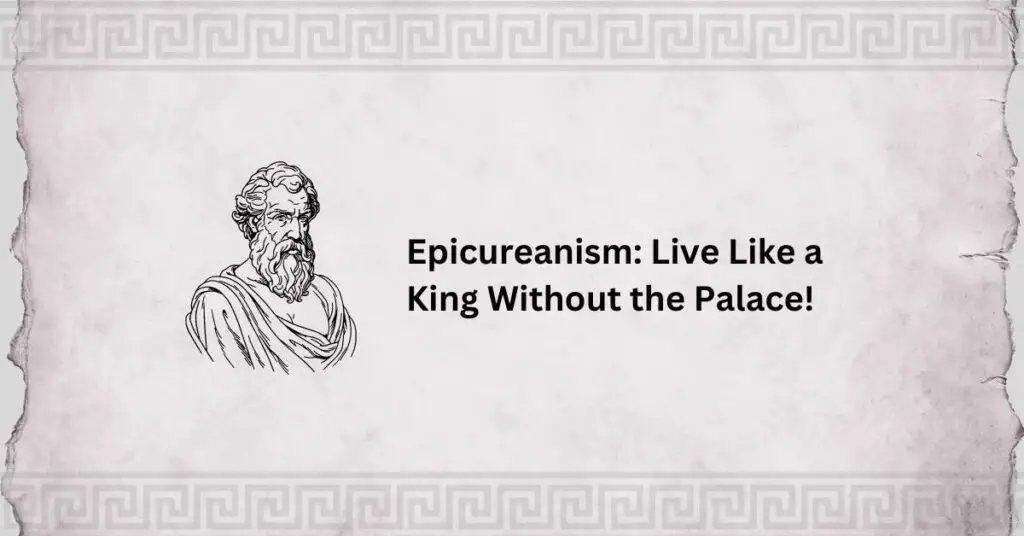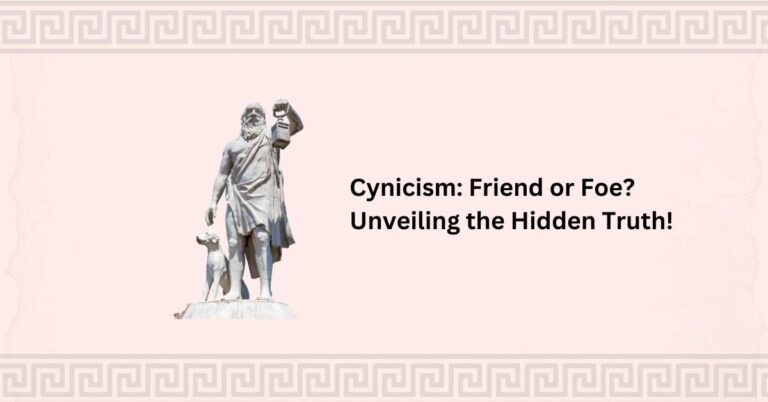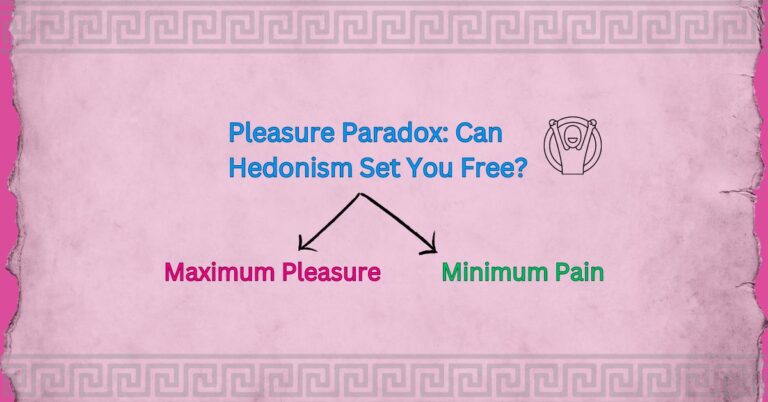Epicureanism: Live Like a King Without the Palace!
Epicureanism isn’t just a fancy word from ancient textbooks; it’s a philosophy that promotes finding happiness through simple pleasures. Born in the mind of Epicurus during the bustling era of Ancient Greece, this philosophy teaches us that pleasure is the ultimate good. But hold on, it’s not about indulging every whim—it’s about finding a balance that brings peace and satisfaction to life.
Fast forward to today, and you might wonder, “What does a 300 BCE philosophy have to do with me?” More than you might think! We live in a world that often confuses happiness with having more stuff, but Epicureanism invites us to rethink what truly matters. This blog post will dive deep into the core principles of Epicureanism and how we can weave them into our everyday lives to foster genuine contentment. Stay tuned as we explore these timeless ideas and apply them to our modern quest for a fulfilling life.
The Historical Context of Epicureanism:
Epicurus: The Man Behind the Philosophy
Epicurus wasn’t just another philosopher with lofty ideas; he was a trailblazer who changed how people thought about happiness. Born in 341 BCE on the island of Samos, he moved to Athens, the heart of intellectual thought, to share his revolutionary ideas. Here, in a school named “The Garden,” he nurtured a community dedicated to living out his philosophies.
Athens: A Cultural Melting Pot
During Epicurus’s time, Athens was a vibrant hub of philosophical debate. Ideas about life, ethics, and the universe flowed as freely as olives and wine at a Greek symposium. In this bustling environment, Epicurus’s thoughts on simple pleasures and self-sufficiency provided a refreshing contrast to the complexities of Athenian life.
Philosophical Rivalries: The Stoics vs. Epicureans
Epicurus’s philosophy didn’t exist in a vacuum. He found himself often at odds with the Stoics, his chief philosophical rivals. While Epicureans sought happiness by minimizing desires and enjoying simple pleasures, the Stoics focused on virtue and accepting life’s pains as necessary. This ongoing debate added a rich layer to Athenian culture, influencing thinkers and the general populace.
The Spread of Epicureanism Across the Hellenistic World
After Epicurus’s death, his philosophy didn’t fade away but flourished. His followers spread across the Mediterranean, carrying his teachings with them. This expansion shows how resonant his ideas were, finding a place in diverse cultures and influencing countless individuals in their quest for happiness.
Core Principles of Epicureanism:
Foundations of Epicurean Philosophy
At its heart, Epicureanism asks us to rethink pleasure. Epicurus championed the idea that the ultimate goal of life is to maximize pleasure. However, his definition of pleasure was radically different from the common indulgences we might imagine. Let’s dig a little deeper into these foundational beliefs.
Pleasure as the Greatest Good
What did Epicurus really mean by pleasure? Contrary to popular belief, he wasn’t endorsing a hedonistic rampage of sensory delights. Instead, Epicurus pointed to the joy of tranquility—freedom from pain and mental distress as the highest form of happiness. He taught that the most satisfying pleasures are those that soothe the soul, like the contentment found in good health or a meaningful conversation. It’s about quality, not quantity.
Ataraxia and Aponia: The Twin Goals
The twin goals of Epicurean philosophy, ataraxia (peace of mind) and aponia (absence of pain) offer a blueprint for a serene life. Ataraxia goes beyond mere stress relief; it’s about cultivating a mental state where anxiety doesn’t exist. Aponia, on the other hand, encourages us to avoid physical pain and discomfort, promoting a lifestyle that supports long-term well-being. Together, they guide us to make decisions that protect our inner calm and physical health.
The Role of Knowledge
Why did Epicurus emphasize knowledge so much? Because ignorance breeds fear, and fear shackles us. By understanding the workings of the world, Epicurus believed we could banish the shadows that haunt our minds—fears of the unknown, death, and superstition. Learning about the universe and our place in it empowers us, reducing existential dread and allowing us to focus on enjoying life.
Epicurean Practices and Lifestyle:
Living the Philosophy: Daily Practices
Epicureans didn’t just talk the talk; they walked the walk. For an Epicurean, daily life was structured around simple, repeatable practices to maintain peace of mind and bodily health. This included meditation on philosophical tenets, moderate eating, and cultivating personal virtues such as self-control and wisdom. These habits helped them stay aligned with their core belief: that true happiness comes from inner peace and the absence of pain.
The Garden: A Community of Like-Minded Thinkers
Epicurus established a community known as “The Garden” in Athens, which was quite revolutionary at the time. Unlike the academic exclusivity of Plato’s Academy or Aristotle’s Lyceum, The Garden was open to all, including women and slaves—an egalitarian idea that was radical for its time. This space wasn’t just a place to live; it was a living workshop of Epicurean philosophy, where members could practice their ideals in harmony with others, sharing insights and supporting one another’s pursuit of happiness.
The Central Value of Friendship
For Epicureans, friendship wasn’t just a social convenience; it was an essential pillar of a good life. Epicurus famously said, “Of all the things which wisdom provides to make life entirely happy, much the greatest is the possession of friendship.” Friends were seen as vital to providing emotional support, intellectual stimulation, and practical assistance, all of which contributed to the ataraxia and aponia that Epicureans cherished.
Modern Parallels: Minimalism and Mindfulness
Today’s trends, like minimalism and mindfulness, echo many Epicurean practices. Minimalism, with its emphasis on reducing clutter to enhance the quality of life, mirrors the Epicurean advocacy for simplicity and focus on essentials. Mindfulness, similarly, encourages a presence of mind and calmness that aligns closely with the Epicurean pursuit of ataraxia. Both modern movements and ancient Epicurean practices teach us that less can indeed be more and that a peaceful mind is a paramount treasure.
By integrating these practices into their daily lives, Epicureans crafted a lifestyle that was not only sustainable but deeply fulfilling. These age-old habits offer us timeless lessons on how to reduce stress and increase contentment, showing that the pursuit of simplicity and tranquillity is just as relevant—and radical—today as it was in ancient Athens.
Misconceptions and Criticisms of Epicureanism:
Busting Myths: Hedonism and Indulgence
A common misconception about Epicureanism is that it champions unrestrained hedonism and indulgence. In truth, Epicurus preached quite the opposite. He advocated for a disciplined pursuit of pleasure, where pleasure is defined primarily as the absence of suffering, not the relentless chase of physical delights. Epicureans aimed for a balanced life where simple pleasures lead to lasting happiness, steering clear of overindulgence that might cause future pain or disturbance.
Philosophical Rivalries: Critiques from Other Schools
Epicureanism often found itself at odds with contemporary philosophical movements. The Stoics, for example, critiqued Epicureans for placing too much emphasis on pleasure, even in its moderated form. They argued that virtue and moral integrity should be the focus of a philosophical life, not the pursuit of personal pleasure, however moderated. Platonists and Aristotelians also had their differences with Epicurean thought, often dismissing its materialistic view of the universe as overly simplistic.
The Decline of Epicureanism
By the rise of the Roman Empire, Epicureanism began to wane in influence. Several factors contributed to its decline. The rise of Christianity, which promoted different values and criticized the Epicurean focus on pleasure, played a significant role. Additionally, the intellectual climate shifted towards Neoplatonism and other philosophies that emphasized mysticism and the transcendent, which were at odds with Epicureanism’s materialist and empiricist roots.
Why Understanding the Misconceptions Matters
Addressing these misconceptions is crucial not only for a fair assessment of Epicurean philosophy but also for appreciating its relevance today. By clearing up the confusion around its principles, we can better understand how Epicureanism can contribute to modern discussions about how to live a balanced and fulfilling life.
This exploration of the critiques and common misunderstandings surrounding Epicureanism highlights the depth and resilience of this ancient philosophy. As we debunk myths and consider historical perspectives, we uncover a rich tapestry of thought that continues to offer valuable insights into the art of living well.
Epicureanism in the Modern World:
A Modern Revival: Epicureanism Today
Epicureanism is experiencing a revival in the 21st century, finding new relevance as people search for sustainable paths to happiness amidst modern complexities. This ancient philosophy offers a counterpoint to our often frenetic, consumption-driven culture, promoting a life of simplicity and inner peace. As we grapple with digital overload and environmental sustainability issues, the Epicurean focus on living thoughtfully and minimizing harm speaks directly to contemporary concerns.
Epicureanism in Contemporary Self-Help
The principles of Epicureanism have seamlessly woven themselves into modern self-help narratives. Concepts like minimalism, intentional living, and the pursuit of sustainable happiness echo Epicurean tenets. Self-help gurus often advocate for a lifestyle that mirrors the Epicurean emphasis on curbing desires and focusing on personal well-being through mindful choices, proving that these ancient ideas still resonate in our modern quest for a balanced life.
Alignment with Modern Scientific Understanding
Interestingly, modern psychology and neuroscience support many Epicurean ideas. Studies on happiness affirm that beyond a certain point, material gains do not significantly increase our well-being; instead, emotional fulfillment and stress-free living contribute more to lasting happiness. This scientific backing lends credibility to Epicurean practices, emphasizing experiences over possessions, much like the happiness research findings suggest.
Practising Epicureanism in Daily Life
Adopting Epicureanism today can be both simple and transformative. Start by identifying what truly brings you joy—often, these are not material objects but experiences, relationships, and personal growth. Practice gratitude and mindfulness to cultivate ataraxia and strategically reduce sources of pain and discomfort in your life. Embrace community and build strong, supportive relationships, reflecting the Epicurean belief in the value of friendship.
As we explore Epicureanism’s place in the modern world, it’s clear that this ancient philosophy has much to offer us today. Its principles help us navigate life’s challenges with grace and poise, encouraging a lifestyle prioritizing lasting happiness and personal fulfillment. Whether through lifestyle changes, mental health practices, or social interactions, the essence of Epicureanism can significantly enhance our well-being in today’s fast-paced world.
Case Studies and Real-Life Applications:
Profiles of Modern Epicureans
Consider the story of Clara, a software developer who embraced Epicurean principles to transform her hectic life. After years of chasing career milestones and material success, she found herself stressed and unfulfilled. By applying Epicurean ideals, Clara shifted her focus to quality time with loved ones, personal well-being, and professional satisfaction rather than just promotions. Her lifestyle now reflects a balance that prioritizes peace of mind and joy over excess and overachievement.
Transforming Daily Life with Epicureanism
John, a retired teacher, illustrates how Epicurean practices can shape everyday routines. He practices moderation in his habits and spends time each day in his community garden, fostering both a connection to nature and strong neighborhood ties—key aspects of his happiness. John’s approach reduces stress and promotes a healthy, active lifestyle, showing the tangible benefits of a philosophy that values simplicity and community.
Psychological Insights and Lifestyle Coaching
The principles of Epicureanism align closely with modern psychological insights about happiness and well-being. Psychologists have found that practices like mindfulness and gratitude—which are reminiscent of Epicurean ataraxia—can significantly boost mental health. Lifestyle coaches often use these tools to help clients reduce anxiety, improve emotional resilience, and find joy in the present moment. These strategies, grounded in ancient wisdom, are supported by contemporary research showing their effectiveness in enhancing life satisfaction.
Empirical Support for Epicurean Living
A notable study by psychologists at a major university found that participants who practiced Epicurean principles of minimizing desires reported higher life satisfaction and lower stress levels compared to a control group. This empirical evidence supports the notion that adopting Epicurean habits—such as valuing friendships, focusing on personal growth, and living mindfully—can lead to a more fulfilling life.
These case studies and insights from both ancient philosophy and modern science demonstrate the practical applications of Epicureanism today. By embracing these age-old principles, individuals can make profound changes in their lifestyles and mindsets, leading to a richer, more satisfying existence.
Conclusion
Epicureanism, a philosophy that originated over two millennia ago, continues to resonate and influence how we think about happiness today. Its core message—seeking pleasure through simplicity, knowledge, and meaningful relationships—offers a profound counterbalance to the often chaotic and possession-focused modern world. This philosophy’s enduring legacy reminds us that true contentment comes from within and through the choices we make every day.
I encourage you to reflect on how the principles of Epicureanism could enhance your own pursuit of happiness. Could simplifying your desires, focusing more on personal well-being, and nurturing deeper friendships enrich your life? How might embracing a life of mindful pleasures and peace of mind change your daily experiences?
I invite you to share your thoughts and comments below. Have you tried integrating any Epicurean practices into your daily routine? What changes have you noticed? Let’s discuss how these ancient ideas can be applied in our contemporary lives to foster happiness and fulfillment.
Together, we can explore the practical ways Epicurean wisdom can be woven into the fabric of our daily lives, helping us to live more thoughtfully and joyously. Your insights and experiences are invaluable as we all strive to lead happier, more balanced lives.



